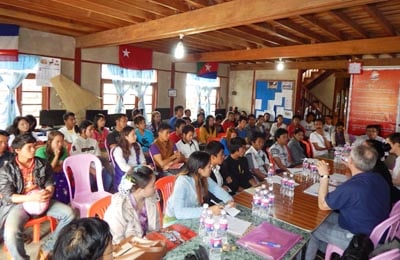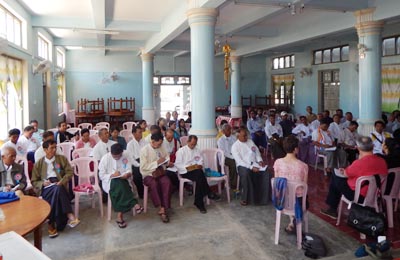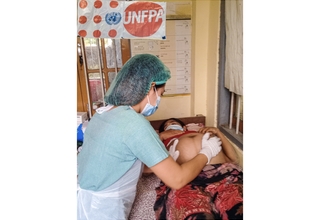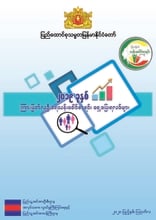Press Article, Yangon -- From the 5 to the 22 May, as a continuing process of consultation, a team of national and international census and conflict sensitivity experts were hired by UNFPA to examine sensitivities around the release of census data. They heard the concerns and expectations of local constituencies and interest groups on census data dissemination. Continuing to meet people face to face on their own ground is critical, the team advised, saying that people want to know how the data can improve their personal and community lives.
Consultations with national and international stakeholders in Yangon ranged from conversations with individuals and small/larger groups from different organisations. The team of consultants had a list of questions to guide their consultations and structure the information they wished to collect. The consultation stage of this assignment concluded with a half day feedback session on the 23 May for everyone who took part in the interviews. This also provided an opportunity for participants to ask questions and provide input to shape future activities for dissemination of the census data.
From the 21 July to 1 Aug a second consultation was conducted. The Mission heard from over 400 people in Mandalay, Mon, Kayin and Kayah. They met with Government’s, District Census Committees, youth and women’s groups, ethnic groups, religious and political leaders. Discussions were held in groups ranging from 20 to 50 participants from these diverse organisations. This was also a chance to provide information about the dissemination of census results and answer questions from the communities.
These consultations had the added advantage of government officials hearing first-hand the concerns that communities had about census data. Importantly, this initiative would help to establish focal points and identify other motivated key persons in the respective State/Region to act as a resource, working with networks and civil society organisations for census data dissemination. They also gave useful insights into how the census data could be disseminated. For example, it was suggested that large billboards be used to disseminate key statistics about the population in their State/Region/Township/Village Tract.

Women, particularly, wanted to establish their own initiatives with round table discussions on education, maternal mortality, and disability. They asked for help to coordinate this once the data is released. Youth were interested in how the data will help with job creation. In Mandalay, for example, District Census Committees want to be reactivated and join with different groups to help in census data dissemination and build understanding in this. Inter faith groups in Mandalay and Mon want to collaborate in census data dissemination “in areas with good intentions”, while the Government on its side has asked groups to help their societies to understand why it is taking so long to release data and why this will be released in phases.
Janet Jackson, UNFPA Country Representative, said: “People from different walks of life have genuine concerns about how census data is going to be released and what they can expect from it. They want honest answers to their questions. Others want to get involved in ensuring that the data is well understood and used properly for development and greater equity. Hearing all these views and integrating people's ideas into the plans for data dissemination will be critical in building trust, participation and leadership in data use on the ground”.

Visits to the Census Office in Nay Pyi Taw are now taking place by these same groups. They met directly with the Director General and the Directors and saw the data processing in motion. At the end of the visit one sceptic, who had asked many questions and had many queries, said: “Now I’m satisfied”! Other representatives from Kayin and Kayah will visit the Census Office next week. In October consultations will take place in Kachin, Chin, and Shan.
Sarah Clarke, one of the consultants, said: “Hearing from communities and understanding their perspectives on the census has been a great privilege. It's clear that many people look forward to the insights and data that the census will provide so they can better plan for and meet the needs of their communities”.



